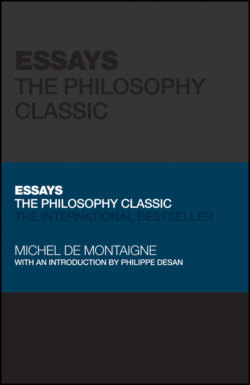Читать книгу Essays - Michel de Montaigne - Страница 13
MONTAIGNE THE PHILOSOPHER
ОглавлениеFor Montaigne, reason and imagination are both equal in terms of producing new knowledge. Like the oscillations of the world and the universe, “the body and soul are in perpetual moving and action” (II, 37). This perpetual motion defines life itself. Montaigne's philosophy is movement since there can be no knowledge outside the human body. We could argue that Montaigne is a wanderer of writing: “my style and my wit wander at the same rate” (III, 9). The wandering body never allows itself to be imprisoned in common places; it constantly flees forward. Montaigne is always elsewhere; we rarely find him where he tells us he is going. From this understanding, all knowledge becomes relative insofar as it depends on bodily experiences that will sometimes adapt to the mind, and at other times dominate the mind.
Montaigne acknowledges that the mind and the body often assert their monstrosity in remarkable ways (the religious wars of his time, for example), but this is an evil that he deems worthy of consideration and reflection. Theory and action are for him inseparable. As he puts it, “my fancy does not go by itself, as when my legs move it” (III, 3). All ideas require action. The mind may explore the world in all its shapes and forms, but personal experiences validate the ideas that we form. This journey through the meanders of thought – a thought which can only be understood in its relation to different thoughts – leads Montaigne into an analysis of himself, a process we call introspection. While he lays himself open to the many contradictions of his experience, he chooses not to suppress them from his book.
Introspection and reflections about the self only work because Montaigne establishes “commerces” with others, principally his friend who passed away (Étienne de la Boétie), notable women in his circle such as Diane de Foix, and books (ancient philosophers, whom he copiously references and quotes). And yet, Montaigne would not really become the Montaigne we know and appreciate today, i.e. the observer of cultural differences and the founder of anthropology (a discipline that is not prescriptive, but simply tries to describe human variation), until he finally accepted (after 1585) to content himself with “reporting” human behaviors in all their contradictions – rather than looking for a common denominator in them.
“Others form man; I only report him: and represent a particular one, ill fashioned enough, and whom, if I had to model him anew, I should certainly make something else than what he is but that's past recalling” (III, 2).
Montaigne would soon abandon any attempt to find the “human condition” (his term), and therefore a possible unity or an essence of the human race, in order to concentrate on a descriptive anthropology. Descartes is often presented as the architect of modern philosophy (creating a blueprint of human essence). Montaigne remains an endless surveyor, observer and describer of human customs and mores.
